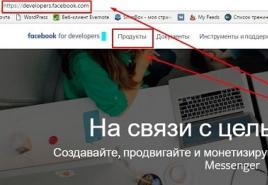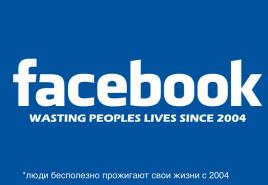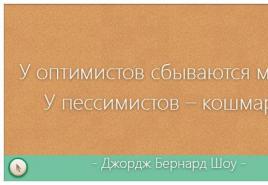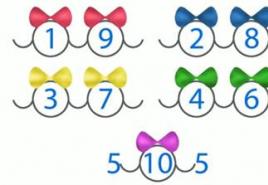A child with a disability attends a kindergarten. Kindergarten for children with disabilities - features of preschool education. Legislative basis of the issue
Children with disabilities can be brought up at home or attend Kindergarten. In accordance with Art. 18 of the Federal Law "On the Social Protection of the Disabled in the Russian Federation", such children can attend special preschool institutions for children with disabilities or, on a general basis, attend a regular kindergarten (general preschool institution). The possibility of staying in a general preschool institution is determined depending on the state of health of the child.
A preschool educational institution teaches children according to general educational programs of preschool education of various kinds. For children under the age of seven, it provides education, training, supervision, care and rehabilitation.
According to the Model Regulations on a preschool educational institution, approved by order of the Ministry of Education and Science of the Russian Federation of October 27, 2011 No. No. 2562 (hereinafter referred to as the Model Regulation on a pre-school educational institution), to pre-school (educational institutions include educational institutions the following types:
- Kindergarten;
- Kindergarten for young children;
- Kindergarten for children of preschool (senior preschool) age;
- Kindergarten supervision and rehabilitation;
- compensatory type kindergarten;
- Kindergarten of combined type;
- a kindergarten of a general developmental type with priority implementation of activities in one of the areas of development of pupils;
- child development center - kindergarten. The procedure for recruiting a preschool educational institution is regulated by the charter.
Children aged from 2 months to 7 years old are admitted to a preschool educational institution. Admission of children is carried out on the basis of a medical report, an application and documents proving the identity of one of the parents (legal representatives).
Children with disabilities, children with disabilities are accepted into groups of compensatory and combined orientation of a preschool educational institution only with the consent of their parents (legal representatives) on the basis of the conclusion of the psychological, medical and pedagogical commission.
When accepting children with disabilities, children with disabilities in preschool educational institutions of any kind, the preschool educational institution is obliged to provide the necessary conditions for organizing corrective work.
Based on the application of the parents and the expert opinion, the child is admitted to one or another kindergarten, where persons with the necessary professional and pedagogical qualifications will work with the child. Teachers and specialists work with children attending kindergarten daily: instructor physiotherapy exercises, teacher-speech therapist, teacher-psychologist, teacher of additional education (preparation for studying at school), music director, head of the theater studio, teacher of fine arts and others.
In large cities, in particular in Moscow and St. Petersburg, a whole network of preschool institutions for children with speech, hearing, vision, and musculoskeletal locomotive system, with disadvantages mental development, as well as for children with common diseases. In small towns, urban-type settlements and other small settlements specialized preschool institutions for children with disabilities, as a rule, are not created. Disabled children have to attend general kindergartens or go to the regional center.
Special conditions are created in kindergartens for the education and upbringing of disabled children: sports and GYM's, swimming pools, art studios, theater studios, music halls, phytobars, etc. If necessary, children receive enhanced nutrition and massage, and are also under the constant supervision of a speech therapist or defectologist.
The educational process for children with disabilities can be carried out according to special programs. For example, in the Moscow Preschool Educational Institution No. 1790, in order to improve the health of children with pathologies of the musculoskeletal system, pouring is carried out ( air baths, sponging, gargling), massage, self-massage, acupressure, hydromassage, herbal medicine, oxygen cocktail, breathing exercises, gymnastics after sleep, sessions with the use of the Chizhevsky chandelier, Maremed sessions. For a comprehensive assessment of the physical condition of children, three times a year, diagnostics of physical development and physical fitness, diagnostics for swimming, summary diagnostics and identification of the growth rate of physical qualities are carried out; diagnostics according to M. Lazarev's program "Hello" and determination of the level of maturity of nervous processes. Physical rehabilitation, psychological correction, speech therapy, counseling of parents and their training in corrective techniques are carried out daily with disabled children.
Educators and parents are ambivalent about the idea of educating all children with disabilities in one institution. On the one hand, many say that their child feels uncomfortable in the same group with healthy children. On the other hand, there are examples that prove that it is not always appropriate to draw a line between a healthy child and a disabled child.20 It seems that the answer to this question depends on the health of the child. After all, children who have serious health problems, such as children with heart defects, diabetes or bronchial asthma, of course, need special care, and teachers working with such children must have special knowledge.
The Law of the Russian Federation "On Education" determines that the founders of educational institutions implementing the main general educational program of preschool education, as a general rule, can establish a fee for the maintenance of a child in these institutions. However, for the maintenance of children with developmental disabilities, as well as children with tuberculosis intoxication attending state and municipal educational institutions that implement the basic general educational program of preschool education, parental fees are not charged.
The rest of the list of benefits is established at the level of subjects of the Russian Federation. In many constituent entities of the Russian Federation, a preferential fee for the maintenance of children in preschool educational institutions or free maintenance of children is provided if both parents are disabled of group I or II, if the family of a disabled child has many children, if the child's family belongs to the category of families of military personnel and employees of law enforcement agencies Ministry of Internal Affairs who died in the line of duty.
Full or partial exemption from kindergarten fees, as a rule, is carried out on the basis of an application from the parent of such a child, which is accompanied by a certificate from the place of residence on the composition of the family, a copy of the child's birth certificate and other supporting documents.
Hello!
In accordance with paragraph 7, paragraph 27 - paragraph 28 and paragraph 45 of the Order of the Ministry of Education and Science Russian Federation(Ministry of Education and Science of Russia) dated October 27, 2011 N 2562 Moscow "On approval of the Model Regulations on a preschool educational institution"
A pre-school educational institution may carry out the rehabilitation of disabled children if there are appropriate conditions in the institution.
Children with disabilities, children with disabilities are accepted into compensatory and combined groups only with the consent of their parents (legal representatives) on the basis of the conclusion of the psychological, medical and pedagogical commission.
When accepting children with disabilities, disabled children in preschool educational institutions of any kind, the preschool educational institution is obliged to provide the necessary conditions for organizing corrective work, in groups for the supervision and care of children - conditions that take into account the peculiarities of their psychophysical development.
P When including children with disabilities and disabled children in the composition of the pupils of a preschool educational institution, the material and technical base of the preschool educational institution should ensure the possibility of their unhindered access to the premises of the preschool educational institution, as well as their stay in these premises (the presence of ramps, handrails, extended doorways, elevators, special chairs and other conditions). Children with disabilities, children with disabilities have the right to use the necessary technical means, as well as the services of an assistant (assistant) providing them with the necessary technical assistance.
That is, a preschool educational institution is obliged to provide conditions for organizing corrective work with your child. At the same time, your child has the right to use the services of an assistant (assistant).
LETTER OF THE MINISTRY OF EDUCATION OF THE RUSSIAN FEDERATION DATED JUNE 7, 94 N 58-M (*1) ON THE IMPLEMENTATION OF THE RIGHTS OF CHILDREN IN ADMISSION TO PRESCHOOL AND GENERAL EDUCATIONAL INSTITUTIONS clarified
In accordance with the Law of the Russian Federation "On Education" (Article 32, clause 2 "o") * 3, a preschool educational institution has the right to independently form a contingent of pupils within the quota specified by the license, unless otherwise provided by the Model Regulations on this type of educational institution and the Law . Admission of children to preschool educational institutions is carried out in accordance with the established procedure on the basis of an application from parents (persons replacing them). A preschool educational institution is obliged to provide supervision, care, upbringing and education of children, taking into account the individual characteristics of each child. The selection of children in a preschool educational institution and their elimination from it are not allowed. With the consent of the parents and on the recommendation of a psychological, medical and pedagogical consultation, children can be sent to preschool educational institutions of a compensatory type or to other preschool educational institutions that have conditions for corrective work with children. Based on the data bank on the order of placement of children and the availability of places in preschool educational institutions, educational authorities inform parents (persons replacing them) about the forms, content and methods of work of various preschool educational institutions and ensure that their educational needs are met to the maximum extent possible based on the existing conditions. .
That is, a preschool educational institution is obliged to provide supervision, care, upbringing and education of children, taking into account the individual characteristics of each child. The selection of children in a preschool educational institution and their elimination from it are not allowed. Therefore, the DOW has the right to recommend you to hire a nanny, but has no right to require you to conclude the specified Agreement.
The procedure for finding a child in the Dow was established by the Decree of the Government of Moscow dated January 31, 2006. N 62-PP "On the Regulations on the procedure for determining the fee charged from parents (legal representatives), for the maintenance of children in state educational institutions of the Department of Education of the City of Moscow, IMPLEMENTING GENERAL EDUCATIONAL PRESCHOOL EDUCATION PROGRAMS, PRESCHOOL EDUCATIONAL INSTITUTIONS OF THE SYSTEM OF THE DEPARTMENT OF HEALTH OF THE CITY OF MOSCOW AND PRESCHOOL EDUCATIONAL INSTITUTIONS OF THE SYSTEM OF THE DEPARTMENT OF SOCIAL PROTECTION OF THE POPULATION OF THE CITY OF MOSCOW".
The monthly payment is set at the rate of 50 to 110 percent of the minimum wage approved by Federal Law No. 82-FZ of June 19, 2000.
The categories of families and parents (legal representatives) are determined, who are provided with benefits for paying for the maintenance of children and exemption from payment. Payment for the maintenance of the child is made according to the actual number of days of his stay in a state educational institution.
In accordance with clause 4- of the Decree from payment for the maintenance of children in state educational institutions of the system of the Department of Education of the City of Moscow, implementing general educational programs of preschool education, preschool educational institutions of the system of the Department of Health of the City of Moscow and preschool educational institutions of the system of the Department of Social Protection of the Population of the City of Moscow in the amount of 100% exempt:
Families with a disabled child under the age of 18.
That is, you have the right to exemption from paying for the maintenance of a child in preschool.
At the same time, there are no special requirements for the admission of children to the preschool educational institution of the Ministry of Defense of the Russian Federation.
Sincerely, F. Tamara
Unfortunately, not all children are born in good health, and this is very sad to realize. It is good if the disease can be quickly overcome and the child, as a rule, simply outgrows this period.
Dear readers! The article talks about typical ways to solve legal issues, but each case is individual. If you want to know how solve exactly your problem- contact a consultant:
APPLICATIONS AND CALLS ARE ACCEPTED 24/7 and 7 days a week.
It's fast and FOR FREE!
But if not, and the disease becomes a part of his life, then parents have to accept a lot with difficulty, overcome all these difficulties.
The state relies on social payments to support families, benefits, etc. for children with disabilities. So they try to take care of it.
But most parents have to decide on their own. This question concerns the choice of a preschool educational institution - a kindergarten for a child with disabilities and health problems.
General points
Undoubtedly, there are differences between a regular kindergarten and a kindergarten for children with disabilities, for example, with musculoskeletal disorders.
The latter are referred to as a preschool educational institution (preschool educational institution), where the upbringing and education of the child is carried out according to the level and state of his health.
For each case, specialists develop training programs that include the presence of health problems of the pupil and the procedure for his rehabilitation.
Important Concepts
You should not be afraid of such establishments, because even if in your group, where there are absolutely healthy children, there are some with deviations, this does not mean that your child is at risk.
The selection of the composition of the group is carried out in the acceptable norms of the health status of children among themselves, contact and growing up.
Usually a kindergarten for children with disabilities takes no more than 10-15 children into a group, and in more difficult situations - up to 5 people
The educators are teachers of the highest category who have been trained on these children's health problems and its correction in the future.
Kindergartens of this type are subject to specialized support from the state and sponsors, the support of parents goes without saying.
Types of institutions
Kindergartens of the Russian Federation are divided into types, according to which parents and the commission already determine where to send the child:
| Combined type | Kindergartens of this type accept children who are healthy and with slight deviations in health, but within the normal range. It is clear that a blind child will not be taken into an absolutely healthy group of children. Groups are formed in a standard manner, the same rules and requirements apply to all pupils. For children with poor health, a slightly individual program of education and training is being developed, but not very different from the rest |
| Compensating type | This includes children who have significant deviations for health reasons - poor vision or lack thereof, hearing or musculoskeletal system, impaired mental state(strong excitability, nervousness, etc.), speech disorder. With such pupils, global training programs are conducted, the methodology of which is designed specifically to eliminate defects in the child's health as much as possible and contribute to further social adaptation. |
The teaching staff is also selected based on the type of preschool educational institution:
- Speech therapist.
- Therapist.
- Psychologist.
- Masseur.
- Defectologist.
- Doctors of Physical Rehabilitation, etc.
Requirements regarding the group of education are applied to each teacher, educator.
Current regulations
Following, at the level of law, the procedure for organizing organizations for the education of children with disabilities is established.
Normatively, an understanding of a pupil with disabilities for health reasons, a separate training program for each, and an adaptation process are established.
Each compensatory type kindergarten for children with disabilities undergoes an annual certification. The main thing is the observance of sanitary and hygienic standards in the preschool educational institution (decree of the Chief Sanitary Doctor of the Russian Federation No. 26 for 07/10/15).
The training program is carried out in accordance with 30.08.13.
Rules for organizing the work of kindergartens for children with disabilities
The learning process is determined in accordance with the child's identified earlier or during the learning process.
After that, according to the principles, the whole order of education goes through:
- Approach to each child on the principle of individuality.
- Maintaining the child's desire to learn, develop, conduct his activity.
- Interaction in the social environment.
- Versatile development of the child.
- Compliance with individuality to the child, but when combined general group pupils.
- Support for the child's family and relationships in it.
- The dynamics of the development of the child during the entire educational process.
Drawing up individual programs
Kindergarten for children with disabilities is a new world for them. Relationships in it should be friendly and conducive to the development of the child to adulthood.
Teachers of such institutions should give their best when working with such a child, help him to become aware of the world around him.
Regarding the individuality of each child in the kindergarten, the management develops programs for education and training.
These programs are established by specialists of the preschool educational institution on the basis of previous communications with the child and his family.
What are these programs? It is a document on the basis of which the procedure for working with children is established after determining specific health deviations and their causes.
The programs include a number of attachments:
- Understanding the personality and one's place in the world, perception of the world - emotions, curiosity, behavior, etc.
- Speech therapy is to help correct the speech of the child. He may not make hissing or growling sounds, there are many examples.
- Pedagogy, teaching children independence of behavior and maintenance of themselves, showing interest in learning and learning new things.
- The study of human rights, its place in society.
- Therapeutic and health education, understanding the essence of hygiene, maintaining a healthy lifestyle.
- Labor discipline.
Usually such children have a hard time getting used to kindergarten. Especially if the child is susceptible mental disorder, then his reaction to new people, when he is used only to his mother, things and walls, can manifest itself emotionally.
An adaptation program helps to cope with the order of adaptation to the kindergarten. On average, teachers will need about 2 months to establish contact with the child and bring his confidence closer to himself.
After that, it already becomes easier and you can proceed to the main areas of education. After getting used to the kindergarten, a rehabilitation program comes into play.
Kindergarten teachers carry out work on the child's perception and understanding in relation to society, teaching elementary skills and self-service.
What else can be attributed to rehabilitation:
- The spiritual development of the child, the manifestation of his creative nature, curiosity for something.
- Leading a healthy lifestyle, personal hygiene.
- Self-analysis of what is happening.
- Development of oneself as a person.
- Society.
Regarding the education of law, special attention is paid. Here the specifics of work is carried out in several directions, namely:
- surrounding society.
- Child.
- Family.
When developing this program, which is not as simple as it seems, some nuances should be taken into account:
Most importantly, such kindergartens should have health programs. First of all, to help develop in the child an understanding of the essence and importance of maintaining a healthy lifestyle, to prevent or help prevent the possibility of a disease, to carry out preventive measures.
At the proper level, support the physical health of the baby, physical education and wellness procedures.
Who needs to visit such institutions
Which kind of kindergarten is right for you, only medical doctors and the commission issuing a decision on the state of health of the child can say for sure.
If there are no strong deviations, then it is quite possible to attend combined-type kindergartens. In the presence of serious violations, only kindergartens with a specialized direction
Features of classes
Classes are held in general program teaching children. Their perception and understanding of what is happening, what they are required to do, etc.
Of course, following the order of the rules for conducting lessons, but at the same time, not forgetting the approach to each child, as he achieves.
Distribution of pre-school educational institutions for the disabled in Moscow
In Moscow, there are, today, about 235 kindergartens of the type. Every year this number is growing.
Teachers who work in such kindergartens strongly insist on support and state support for their kindergartens, because children with disabilities need a special, individual approach.
The younger generation studying in pedagogical specialties should be involved in activity in such preschool educational institutions.
Children with disabilities (HIA) and children with disabilities can study at any educational organization in the city of Moscow at the choice of the family, taking into account their psychophysical characteristics, individual capabilities and health status. For students with disabilities who have the conclusion of the Central Psychological-Medical-Pedagogical Commission, special learning conditions are created, including:
- implementation of adapted educational programs;
- a variable set of additional education programs;
- organization of an accessible environment;
- provision of special textbooks;
- organization of specialist services (psychologists, defectologists, tutors, assistants);
- providing remedial assistance.
In addition, they work for children with disabilities in Moscow.
2. What does it take for a child to qualify for special learning conditions?
To confirm the right of a child with disabilities, including children with disabilities, to special conditions for education and upbringing in educational institutions in Moscow, it is necessary to obtain an opinion from the Central Psychological, Medical and Pedagogical Commission (CPMPC).
Based on the conclusion of the CPMPC, the educational organization creates special conditions for training and education, taking into account the individual characteristics of the child.
3. What documents are needed for the examination?
To conduct a psychological and pedagogical examination at the CPMPC, you will need:
application or consent of the parent or legal representative of the child to conduct a psychological and pedagogical examination at the TsPMPC of the city of Moscow;
- birth certificate of the child (copy + original for presentation or a copy certified by a notary);
- for children over 14 years old - a passport (copy + original for presentation or a copy certified by a notary);
- passport of the parent or legal representative (copy + original for presentation or a copy certified by a notary);
- a document confirming the authority to represent the interests of the child (copy + original for presentation or a copy certified by a notary);
- for people with disabilities - The form of a medical report can be found in the order of the Moscow City Health Department dated April 1, 2013 No. 297 “On improving the procedure for issuing medical reports on the state of health by medical organizations of the state healthcare system of the city of Moscow and recommendations on organizing educational process for persons with disabilities” (see Appendix No. 3). In the same place, on pages 2-4, there is a list of medical organizations that issue these conclusions (see Appendix No. 1). "> Medical conclusion on the state of health and recommendations on the organization of the educational process in state educational organizations of the city of Moscow (original);
- for children with disabilities, the disabled - a certificate from the Bureau of Medical and Social Expertise (ITU), an individual rehabilitation or habilitation program (copy + original for presentation or a copy certified by a notary);
- for students of educational organizations - the characteristics of the student issued by the educational organization (original);
- written work on the Russian (native) language, mathematics, the results of the independent productive activity of the child (original).
For the organization of special conditions for the state final certification (GIA), the following are also submitted:
- for persons with disabilities - a medical report with recommendations on the creation of special conditions for the delivery of the GIA in the current academic year(original);
- for children with disabilities, the disabled - a certificate from the ITU Bureau, IPRA (copy + original for presentation or a copy certified by a notary);
- for students at home - orders to transfer the student to homeschooling (copies certified by the head of the educational organization).
4. How to sign up for an examination?
Disabled people under 18 are a special category of children who need special care and care from the closest people and society, as well as government agencies. Russia is constitutionally a social state. Therefore, the administrations of the regions and the government of the Russian Federation are obliged to respect the rights of a disabled child in the Russian Federation, as well as to provide organizational and material support to disabled children, including their parents.
Education, training, and treatment of children with disabilities
The rights of a child with a disability at school and in the clinic must be fully ensured. Therefore, children with disabilities preschool age:
1. All conditions for staying in preschool institutions of a standard type are created and the necessary rehabilitation measures are provided.
2. if the state of health does not allow the child to stay in a general institution, then they are sent to special preschool institutions.
What is the law for a child with a disability? According to federal law, children with disabilities have certain advantages over ordinary peers. The right of a child with a disability to education implies:
1. priority placement in preschool institutions;
2. exemption of their parents or guardians from the fee for childcare;
3. the possibility of teaching and educating children with disabilities in non-state educational institutions and at home. At the same time, parents are provided with compensation for these purposes;
4. special (correctional) classes or groups should be created for adolescents and children with developmental disabilities, which should ensure their upbringing and education, as well as treatment, social adaptation and integration into society. This should be done by the educational authorities.
Financing of these educational institutions is carried out according to increased standards. The categories of pupils and students who are sent to these educational institutions, including those who are fully supported by the state, are determined by the Government of Russia.
In addition, children with needs can receive additional types of social assistance:
1. free meals in school conditions;
2. priority admission to kindergartens, free admission;
3. assistance of social services in rehabilitation (psychological, social);
4. sparing regime for passing the exam.
Benefits and rights of families with disabled children
The Federal Children with Disabilities Act of 2019 says that families with children with disabilities can receive free of charge:
1. medical supplies (special shoes, wheelchairs, and so on);
2. medicines prescribed by law;
3. Sanitary-resort treatment once a year, travel is paid both ways;
4. medical treatment;
5. specialized literature for children with certain vision problems.
In addition, there are other benefits:
1. one of the working parents is given 4 additional days off per month;
3. the right to a reduced working week or a reduced working day if they have dependent children under 16 years of age;
4. A ban on reducing wages or refusing to hire for reasons that are associated with the presence of a disabled child.
Transport benefits
1. The law provides for free travel for children with disabilities in public transport (except for taxi travel), as well as for their accompanying person. This may be a parent, social worker or guardian (ID required).
2. payment for travel to the place of treatment of a child with a disability is also free. A travel card for a disabled child may be issued, or monetary compensation for travel may be provided if the relevant papers are issued;
3. Disabled children can also take advantage of a 50% discount on intercity buses, airlines and trains from October to May 15th. At other times, the specified discount will be valid only once.
4. if there is a disabled child in the family from 5 years old who has impaired functions of the musculoskeletal system, it can be used to transport the child. If a vehicle is not provided, then parents are provided with compensation for the use of specialized vehicles.
Cash payments
What is due to a child with a disability from the state in 2019 in terms of cash payments?
1. Until April 2018, the amount is 11,903.51 rubles. Since childhood, disabled people are paid the following amounts:
1) disabled persons of group III - 4,215.90 rubles;
2) in group II - 9,919.73 rubles;
3) with group I disability - 11,903.51 rubles.
The amount of pension payments is subject to indexation at least once a year.
In addition, a monthly cash payment is provided, as well as a set of social services for families with disabled children. The size of the UDV is determined by the desire of the family to partially or fully use social services in kind (in case of refusal, monetary compensation is issued).
A set of social services can be replaced by a cash equivalent. For 2019, a full package of social services is provided in the amount of 1,048.97 rubles per month:
1. 807.94 rubles - provision of medical devices, prescription drugs, medical food;
2. 124.99 rubles - vouchers for Spa treatment;
3. 116.04 rubles - free travel on intercity transport or suburban railway transport to the place where treatment is performed and home.
A non-working parent who cares for a disabled person is provided with a special care allowance. For each child with a disability or disabled since childhood of the first group, a payment is expected in the amount of:
1. 5500 rubles when leaving a guardian, adoptive parent or parent;
2. 1200 rubles when leaving by another person.
For groups 2 and 3 after 18 years of age, the allowance is not allowed. One of the parents of a disabled child can count on early retirement.
03.11.2019







